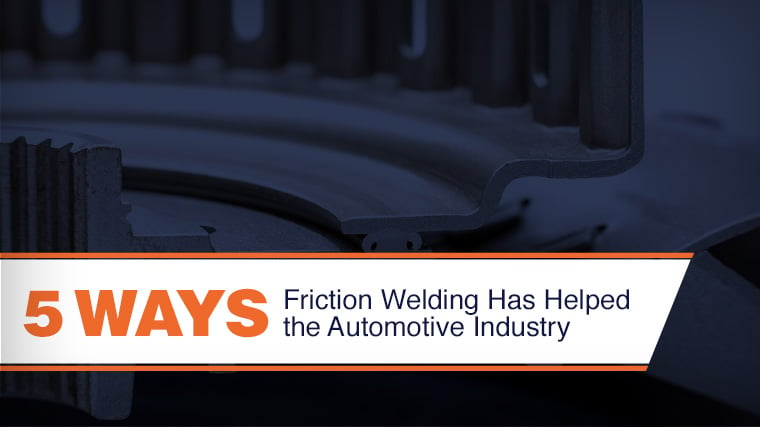
The solid-state, forged-quality bonded joint offered by friction welding has made it an ideal manufacturing process for the automotive industry. With the ability to create highly durable, customized components for everything from commercial to personal use vehicles, friction welding helps Tier One manufacturers design flexible solutions to ever-changing challenges of the automotive industry.
What makes friction welding essential to automotive suppliers?
Because friction welding is highly adaptable to diverse applications, automotive manufacturers have used it to save money while still improving quality. Here’s how:
1. Automated for High Volume Production – Friction welding, and Rotary Friction Welding in particular, allows for high-volume production to help you create parts more efficiently. Our newest joining technology, Low Force Friction Welding, can generate even faster cycle times that what is produced with traditional friction welding. From steering components to camshafts and U-joints, friction welding can accomplish what you need, when you need it. And because friction welding machines may be automated, the technology can be seamlessly integrated into a production cell. This further reduces the overall cycle time to produce the part.
2. Consistency – Parts are made the same way each time, so friction-welded parts are always of the same high quality. And friction welding machines are more reliable than conventional welding techniques, so suppliers don’t have to worry about costly down-time. Plus, the automated nature of a friction welding machine takes individual operator skill out of the equation to deliver durable, defect-free parts you can count on, every time. Compared to traditional methods, MTI’s recently developed advanced controls for friction welding allow the welded components to achieve better length control and/or radial orientation than every before. This helps reduce the as-welded tolerances that may drive the requirement for additional manufacturing operations in the production line, ultimately reducing cost. Low Force Friction Welding refines this process even more, offering higher orientation precision.
3. Ability to join dissimilar metals – When you can forge two dissimilar metals together, you have the opportunity to reduce the weight of the final vehicle. The ability to combine aluminum, in particular, with other materials, has become a critical aspect of automotive production — and friction welding makes it possible. So whether you’re joining aluminum with copper, or steel with low-carbon alloys, the solid-state bond quality you get is always strong, and always consistent.
4. Proven-effective manufacturing technique for the industry – Rotary Friction Welding has been used in the industry for decades, for numerous types of parts, including:
- The MTI-developed Monosteel® piston
- Brake calipers
- Transmission input shafts
- Transmission gears
- …and more
With Low Force Friction Welding, the typical part range expands, meaning the list could grow even longer as more applications see benefits from our newest technology.
5. Reliable process – The automotive industry runs on Just-in-Time inventory, where materials or parts are produced or acquired only as demand requires. Suppliers cannot afford the production disruption that comes from machine down-time and must have a dependable technology in their production process. Rotary friction welding has been a part of vehicle production for over 40 years, and is a proven reliable process. While newer, Low Force Friction Welding is based on the successes of our traditional friction welding processes and paves the way for additional benefits.
MTI is a vital part of the process
Every day, MTI leverages our engineering expertise to build the machines that make the automotive industry work efficiently and effectively, and has developed a standard range of machines that help reduce the design costs for conventional parts. And, we can help you make your parts even better.
Bring us your toughest manufacturing challenges — we’re ready to help you find a solid solution that leverages the best qualities of friction welding. Find out more about how we’ve served the automotive industry for decades — and reach out to see how we can do for you.
LinkedIn: https://www.linkedin.com/company/manufacturing-technology-inc/
YouTube: https://www.youtube.com/c/ManufacturingTechnologyIncMTIJoiningSolutions/videos
